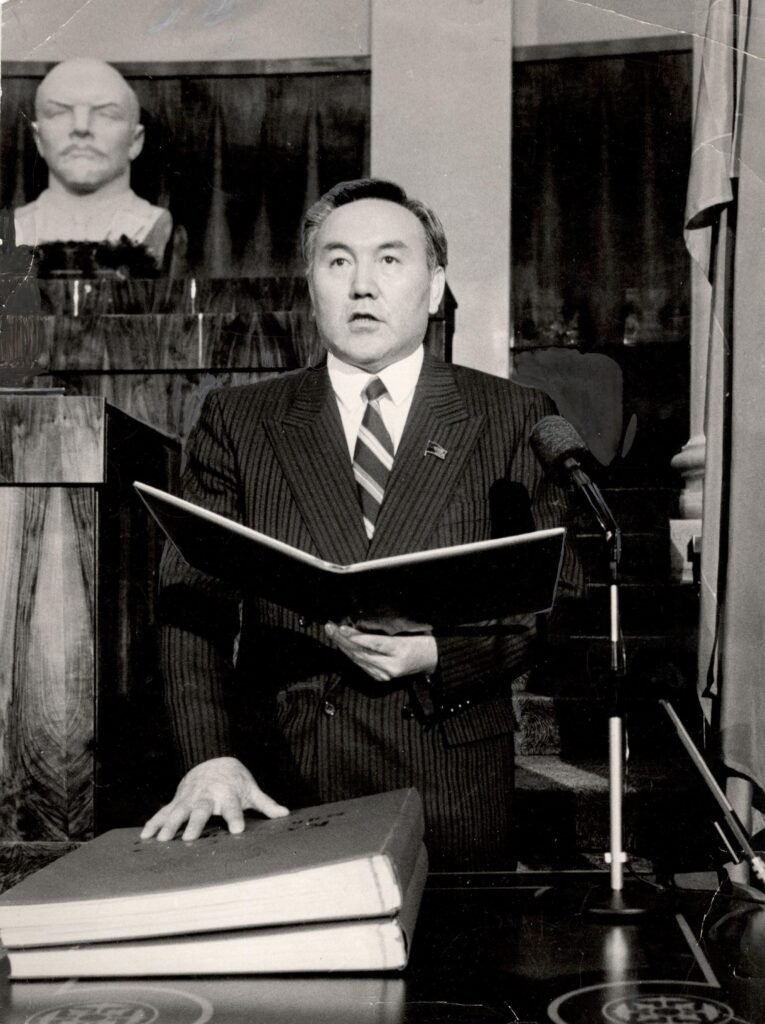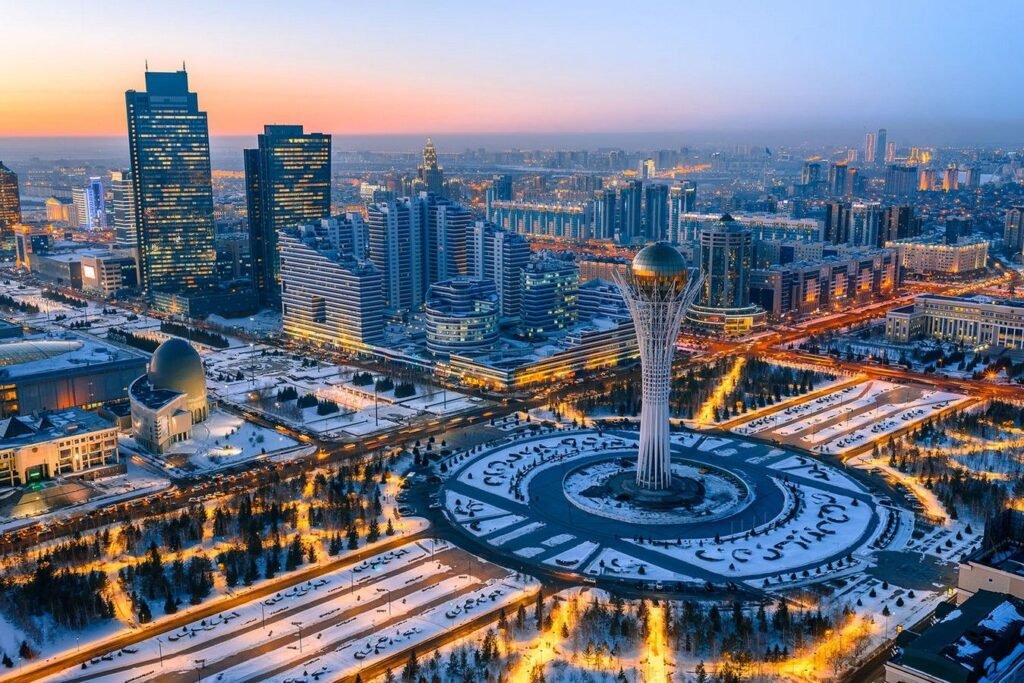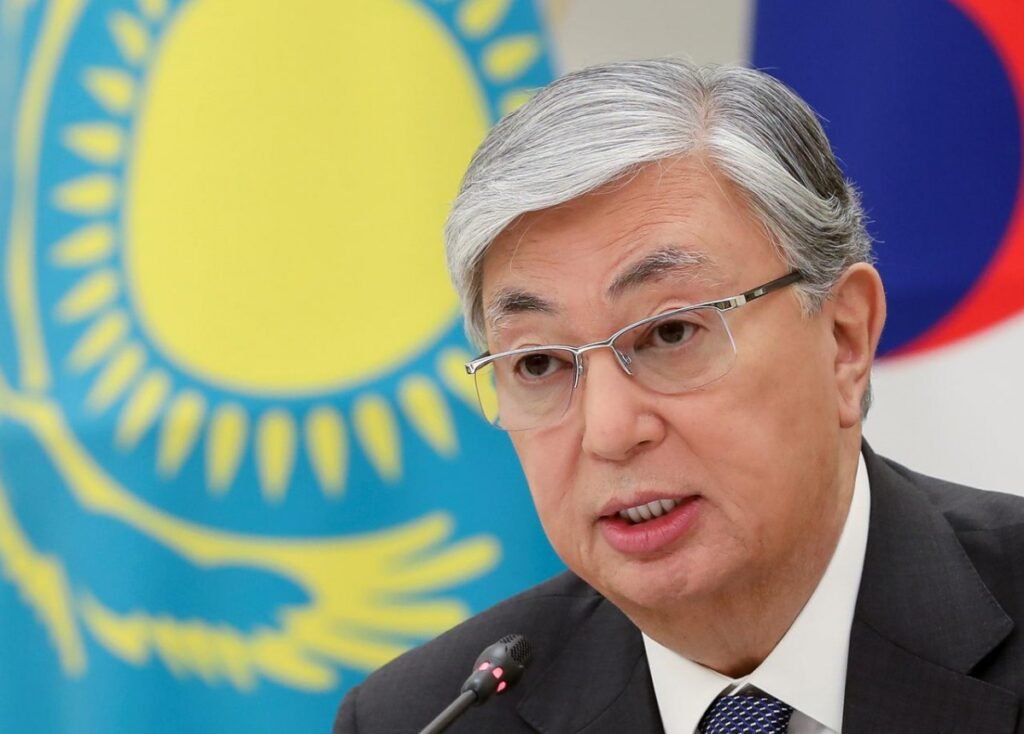Muhammad Asif Noor
Kazakhstan’s 32nd Independence Day stands as a momentous occasion to reflect on the country’s remarkable journey of outstanding foreign policy, diplomacy and progress since gaining sovereignty in 1991. As the nation celebrates its progress and achievements, it is imperative to delve into the transformative shifts in Kazakhstan’s foreign policy dynamics over the years and the significant contributions it has made to fostering peace and prosperity not only on a national level but also within the broader regional and global contexts.
Since gaining independence, Kazakhstan, under the visionary leadership of its first President Nursultan Nazarbayev, and now President Kassym-Jomart Tokayev, has traversed a path of sustainable development and strategic diplomacy.

Egemen Archive
Kazakhstan’s commitment to maintaining political stability and economic growth was a notable achievement during these three decades. The nation’s economic diversification efforts, particularly in sectors such as oil and gas, mining, agriculture, and services, have propelled it into becoming the largest economy in Central Asia.
In foreign policy, Kazakhstan has undergone a transformative journey, evolving from a post-Soviet state to a proactive global player. The country’s multi-vector foreign policy approach, emphasizing collaboration with both Western and Eastern partners, has enhanced its diplomatic standing.
Kazakhstan’s role as a mediator and peacemaker is exemplified by its pivotal involvement in facilitating talks between the United States and Iran, contributing to global efforts for nuclear non-proliferation.
Moreover, Kazakhstan’s initiation and hosting of the Conference on Interaction and Confidence-Building Measures in Asia (CICA) showcase its dedication to fostering regional cooperation and dialogue. The recent SOC meeting in Astana under CICA’s chairmanship highlighted Kazakhstan’s commitment to shaping the organization’s agenda for 2024. The approval of key planning documents and the potential expansion of observer states underscore Kazakhstan’s influence in steering regional dynamics and fostering collaboration.
Kazakhstan’s proactive stance on nuclear disarmament further exemplifies its commitment to global peace and security. As a responsible member of the international community, Kazakhstan renounced its nuclear weapons inherited from the Soviet Union in 1991, setting a precedent for other nations. The country has been an ardent advocate for a world free of nuclear weapons, exemplified by the establishment of the Nazarbayev Center for Nuclear Disarmament in 2012.

In the context of regional collaboration, Kazakhstan plays a crucial role in the Eurasian Economic Union (EAEU), contributing to economic integration and fostering trade ties with neighboring countries. The nation’s efforts in connecting Europe and Asia through the Nurly Zhol infrastructure project and the Khorgos Gateway underscore its commitment to regional connectivity and economic development.
On the global stage, Kazakhstan has championed the cause of sustainable development, leading to its election as a non-permanent member of the United Nations Security Council for the 2017-2018 term. The country has actively contributed to addressing climate change, poverty alleviation, and sustainable development goals.

Kazakhstan’s foreign policy over the past 32 years has been marked by a dynamic approach, reflecting its commitment to fostering positive diplomatic relations at both bilateral and multilateral levels.
The nation’s “Multi-Vector Diplomacy” strategy, introduced by the first President Nursultan Nazarbayev, aimed at striking a balance between engaging with major powers, regional neighbors, and international organizations. This pragmatic approach has allowed Kazakhstan to navigate the complex geopolitical landscape, ensuring economic and political diversification while promoting stability and cooperation.
Bilaterally, Kazakhstan has strategically forged partnerships with major global players, including the United States, Russia, China, and European nations. These relationships extend across various sectors, from trade and investment to technology transfer and cultural exchange. One of the hallmark achievements has been the establishment of the Kazakhstan-U.S. Enhanced Strategic Partnership Dialogue, solidifying ties and fostering collaboration on issues ranging from security to economic development.
In the multilateral arena, Kazakhstan has been a proactive advocate for peace, disarmament, and global security. As a non-permanent member of the United Nations Security Council for the 2017-2018 term, Kazakhstan actively contributed to discussions on critical issues, such as nuclear disarmament, counter-terrorism, and conflict resolution.
The country’s diplomatic efforts in hosting the Astana Process, aimed at resolving the Syrian conflict, showcased its commitment to providing a platform for dialogue and conflict resolution.
Kazakhstan’s role within regional organizations has been equally impactful. As a founding member of the Shanghai Cooperation Organization (SCO) and the Eurasian Economic Union (EAEU), Kazakhstan has played a crucial role in enhancing regional cooperation, economic integration, and security. The nation’s diplomatic initiatives within these frameworks have fostered greater collaboration among member states, contributing to stability and prosperity in the Central Asian region.
Economically, Kazakhstan’s foreign policy has focused on diversification and attracting foreign direct investment. The Astana International Financial Centre (AIFC), launched in 2018, exemplifies Kazakhstan’s commitment to becoming a global financial hub. The AIFC operates based on English common law principles, providing a transparent and investor-friendly environment, and attracting businesses and investments from around the world.
In recent years, Kazakhstan has also intensified efforts to strengthen ties with the European Union (EU). The Enhanced Partnership and Cooperation Agreement (EPCA) between Kazakhstan and the EU, which entered into force in 2020, has expanded collaboration in various fields, including political dialogue, trade, and energy. This agreement signifies a deeper integration into the global economic system and aligns with Kazakhstan’s pursuit of sustainable development.
Kazakhstan’s foreign policy is poised to continue its trajectory of pragmatic and diversified engagement. The nation’s commitment to global issues, including climate change, sustainable development, and conflict resolution, positions it as a responsible and influential actor on the world stage. Kazakhstan’s diplomatic finesse, coupled with its economic resilience and dedication to fostering international cooperation, sets the stage for continued progress and positive contributions to the global community.
As we celebrate Kazakhstan’s 32nd Independence Day, it is essential to recognize the nation’s unwavering commitment to peace, stability, and prosperity. The country’s journey from a newly independent state to a global player has been marked by diplomatic finesse, economic resilience, and a dedication to fostering international cooperation. Kazakhstan’s contributions, whether through its mediation efforts, proactive foreign policy, or commitment to global issues, exemplify its role as a responsible and influential actor on the world stage.
As the nation looks toward the future, the path of progress and contribution to global peace and prosperity is set to continue, further solidifying Kazakhstan’s standing as a beacon of stability and cooperation in Central Asia and beyond.
*The writer is the Director, of the Center for Central Asia and Eurasian Studies- Institute of Peace and Diplomatic Studies
Established in December 2008, The Diplomatic Insight is Pakistan’s premier diplomacy and foreign affairs magazine, available in both digital and print formats.







